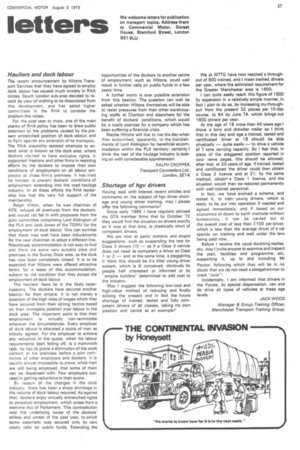Shortage of hgv drivers
Page 29

If you've noticed an error in this article please click here to report it so we can fix it.
Having read with interest recent articles and comments on the subject of hgv driver shortage and young driver training, may I please offer the following comments?
Since early 1969 I have regularly advised my GTA member firms that by October '72 they would find the situation on drivers exactly as it was at that time, ie drastically short of competent drivers.
We are now at panic stations and stupid suggestions, such as suspending the test for Class 3 drivers (II) — as if a Class 3 vehicle does not need as competent a driver as Class 1 or 2 — and at the same time, a staggering (I think this should be it's title) young driver system, which is ill conceived, obviously by people half interested or informed or by "empire builders" determined to add cost to the industry.
May I suggest the following low-cost and high-value method of reducing and finally solving the present and in fact the future shortage of trained, tested and fully competent drivers of all classes, taking my own position and centre as an example?
We at MTTG have now reached a throughput of 800 trained. and I mean trained, drivers per year, where the estimated requirement for the Greater Manchester area is 1600.
I can quite easily reach this figure of 1600 by expansion in a relatively simple manner, in fact I plan to do so, by increasing my throughput from the present 32 places per 10-day course, to 64 by June 74, which brings out 1600 drivers per year.
At the age of 18 more than 40 years ago I drove a lorry and drawbar trailer so I think that in this day and age a trained, tested and certificated driver at 18 should be able physically — quite easily — to drive a vehicle of 7 tons carrying capacity. So I feel that, in place of the staggered position reported in your news pages, this should be allowed; after that, at 20 years of age, if trained, tested and certificated the driver could then obtain a Class 2 licence and at 21, by the same method. obtain' a Class 1 licence, and the situation would then be restored permanently with well-trained personnel.
In fact, we have evolved a scheme, and tested it. to train young drivers, which is ready to be put into operation if needed and agreed immediately, and if based on our economics of down to earth methods without bureaucracy, it can be carried out at the overall cost of less than £100 per driver, which is less than the average driver of a car spends on training and well under the levy being paid now.
Before I receive the usual doubting replies, etc, may I invite anyone to examine and inspect the plan, facilities and programme, etc, supporting it, up to and including Mr Peyton, following which they will be in no doubt that we do not need a sledgehammer to crack "nuts"!
Incidentally, I am informed that drivers in the Forces, by special dispensation, can and do drive all types of vehicles at these age levels.
JACK WOOD Manager & Group Training Officer, Manchester Transport Training Group.
































































































